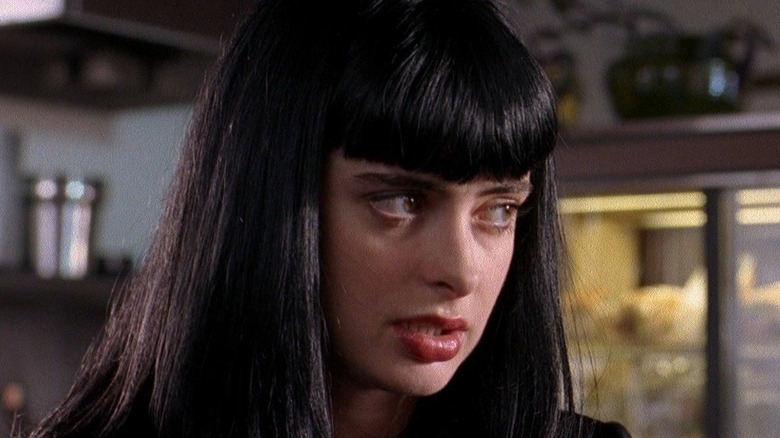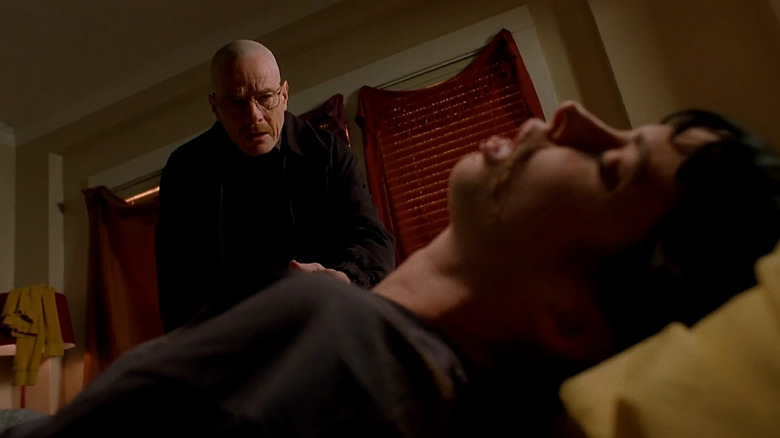Krysten Ritter Underestimated How Intense Jane's Breaking Bad Death Would Be
"Breaking Bad" is one of the greatest shows of the modern era of TV. Creator Vince Gilligan and his creative team crafted a gripping drama that shows how far you can take a character down a dark path and somehow still have people on the internet defend their every atrocity.
The show's Walter White (Bryan Cranston), like Tony Soprano or Eren Yeager, ultimately commits countless un-defensibly vile acts. Sure, all three characters start out with good intentions, but their subsequent actions are unforgivable. When it comes to "Breaking Bad," it's a testament to the writing on the show and its prequel, "Better Call Saul," that learning what happened before the events of "Breaking Bad" makes the show better and even more of a tragedy in hindsight. There may be more stories in the "Breaking Bad" universe (although not from Gilligan), but there will never be another "Breaking Bad."
A pivotal moment in Walter's fall from grace came at the end of season 2, when he watched Jane Margolis (Krysten Ritter), his meth-cooking partner-in-crime Jesse Pinkman's (Aaron Paul) girlfriend, die after suffocating on her own vomit during an overdose. The scene is harrowing and was apparently as hard for the audience to watch as it was for the cast to film. Appearing on PeopleTV's Couch Surfing, Ritter recalled not fully being hit by the reality of the scene until they shot it:
"So, I knew I was gonna die. I'm reading the script, I'm like, 'Cool, rock and roll, she dies. So fun!' But then you're doing it and you're in this death makeup; they built a cast for my chest so that Aaron Paul can really be pounding on my chest. And then Bryan [Cranston], after the take, you just see him sitting quietly in the corner. It was intense, and I will never forget it."
Emotional damage
Jesse and Jane's relationship is a highlight of "Breaking Bad." Krysten Ritter's deadpan performance and knack for sarcasm was a great addition to Aaron Paul's childlike portrayal of Jesse, and the two offered a sweet, endearing respite from the dark world of the meth business part of the story. So when the two became both romantically involved and involved in heroin abuse, it was heartbreaking. For a moment, these two people had found themselves and were genuinely happy. Then, it was over.
Jane's death is not just difficult to watch (and Ritter does a great job), but it also inspires one of Bryan Cranston's finest acting moments. There's a video that goes viral every once in a while from Inside the Actors Studio where Cranston talks about the struggle inside Walter's head in this scene — the desire to stop Jane from poisoning Jesse and jeopardize his business, but also his empathy towards this innocent young woman. But then, Cranston talks about stepping into the character's shoes and seeing Jane as his own daughter. "I see the face of my own daughter in [Jane's] place," an emotional Cranston says. "And I didn't want to, I didn't plan on it."
At a panel at the Tribeca TV Festival in 2018 (via IndieWire), Cranston also talked about creating a list of pros and cons that Walter would think over while deciding whether or not to save Jane. Watching that scene, as short and quick as it is, you can definitely feel the struggle and the internal debate in Walter White, and how his ultimate decision not to save Jane forever changed him for the worse, creating one hell of a character arc.

